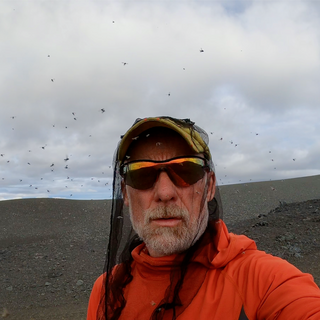Ah Iceland, that magical polar island covered in glaciers, hot springs, lava fields, and…mosquitos. Christof Teuscher learned that the hard way this August when he traversed the island north to south on foot, without any aid, covering the 375-mile route in eight days, 11 hours, and four minutes. That was good enough for a new unsupported fastest known time, as Teuscher shaved an astonishing four and a half days off the benchmark set by Eli Burakian the year before.
Born in the alps of Switzerland and posted up in Oregon for the past 20 years as a professor of Electrical and Computer Engineering at Portland State University, Teuscher possesses both a quick and strong mind. He’s no stranger to epic endurance feats—last year, he completed the 1,000-mile Iditarod on foot—but the North-South Iceland Traverse tested him in unprecedented ways.
While immersed in the ethereal beauty of the country, Teuscher contended with periods of 80-degree temps and stagnant air that brought out the fiercest bloodsuckers he’d ever encountered. Those stretches were followed by bone-chilling wet and cold that sent him into hypothermia.
On top of that, by choosing to go unsupported, Teuscher had to carry all his supplies from start to finish on his back—including a wide array of layers for the ever-changing climate. The heavy pack wreaked havoc on his body in ways you may not have guessed.
Go inside Teuscher’s epic feat this week on the FKT Podcast. Teuscher breaks down how meticulous planning allowed him to move as lightly and efficiently as possible. He covers the highest highs—yes, including covering Iceland’s remote interior highlands—and the lowest lows which extend far beyond the mosquitoes. (Hint: the lows involve roads.)
Read more about Teuscher’s journey on fastestknowntime.com and on his website. And follow his adventures on Instagram.
Subscribe to the Fastest Known Podcast on iTunes, SoundCloud, Stitcher, or Spotify.






Comments
I believe that those mosquitoes were midges unless the warming climate has given them life there finally. It’s well known that they’ve never been there but this could be a bad turning point
I’ve also heard that people mistake midges for mosquitoes there